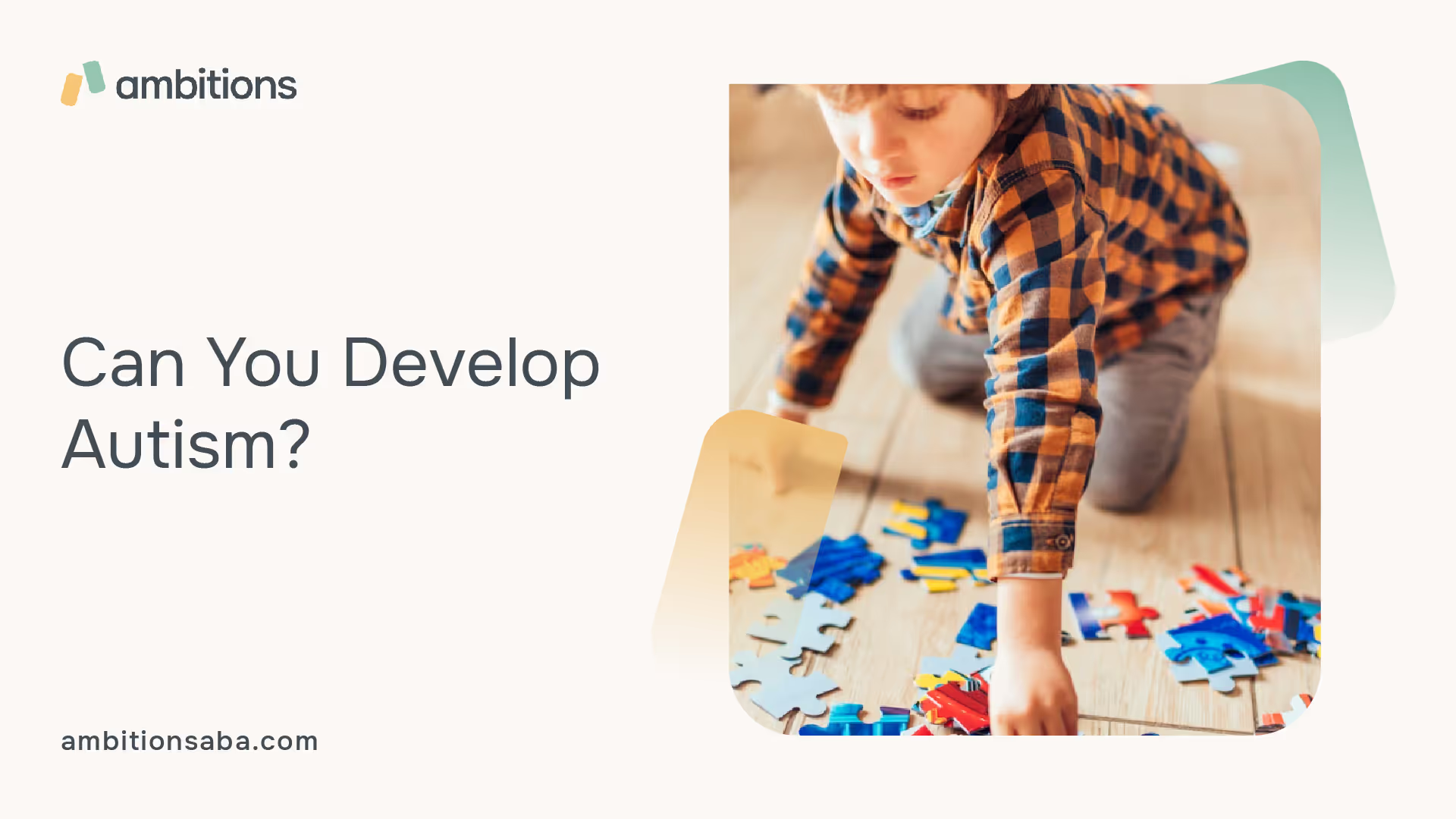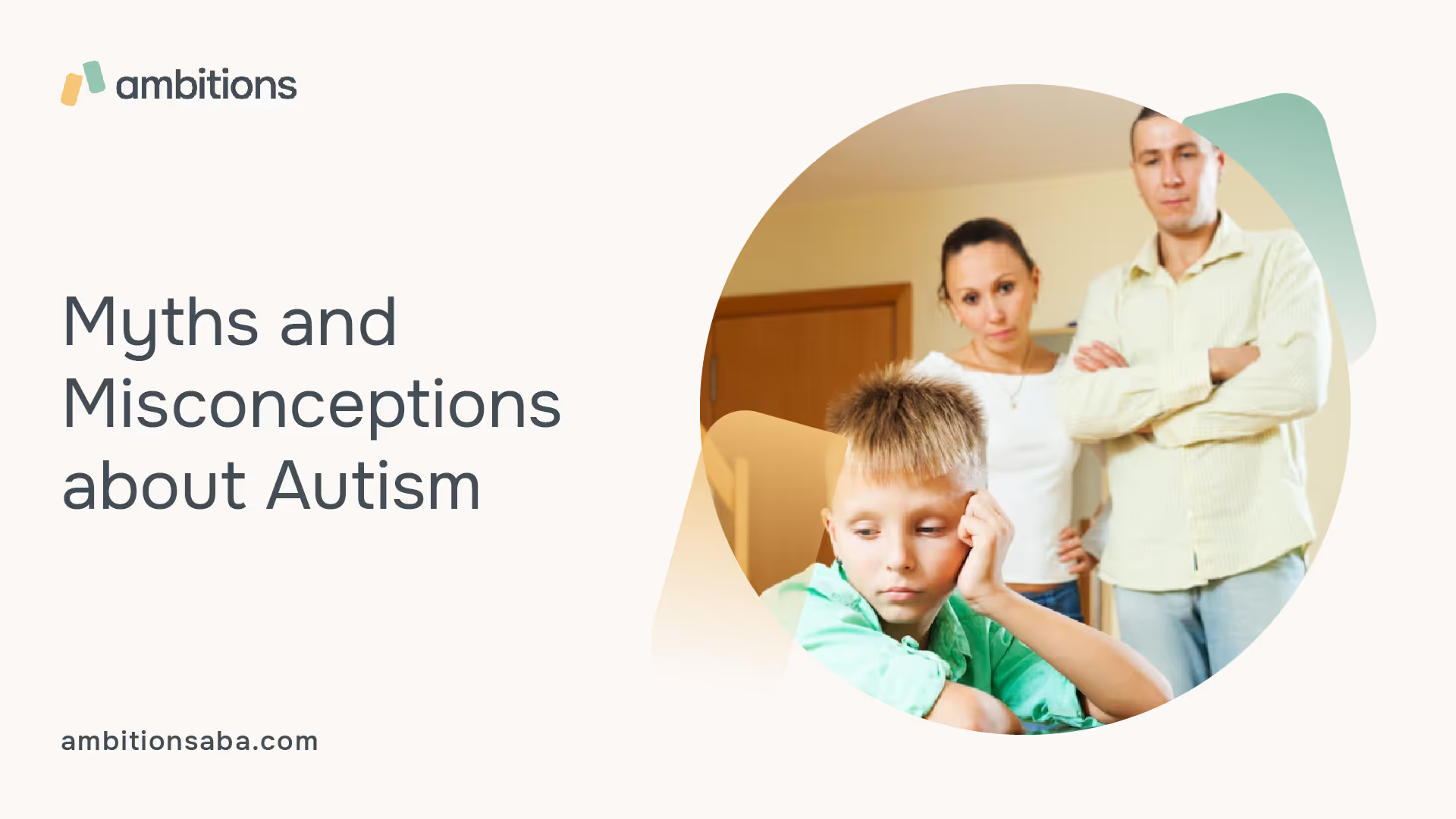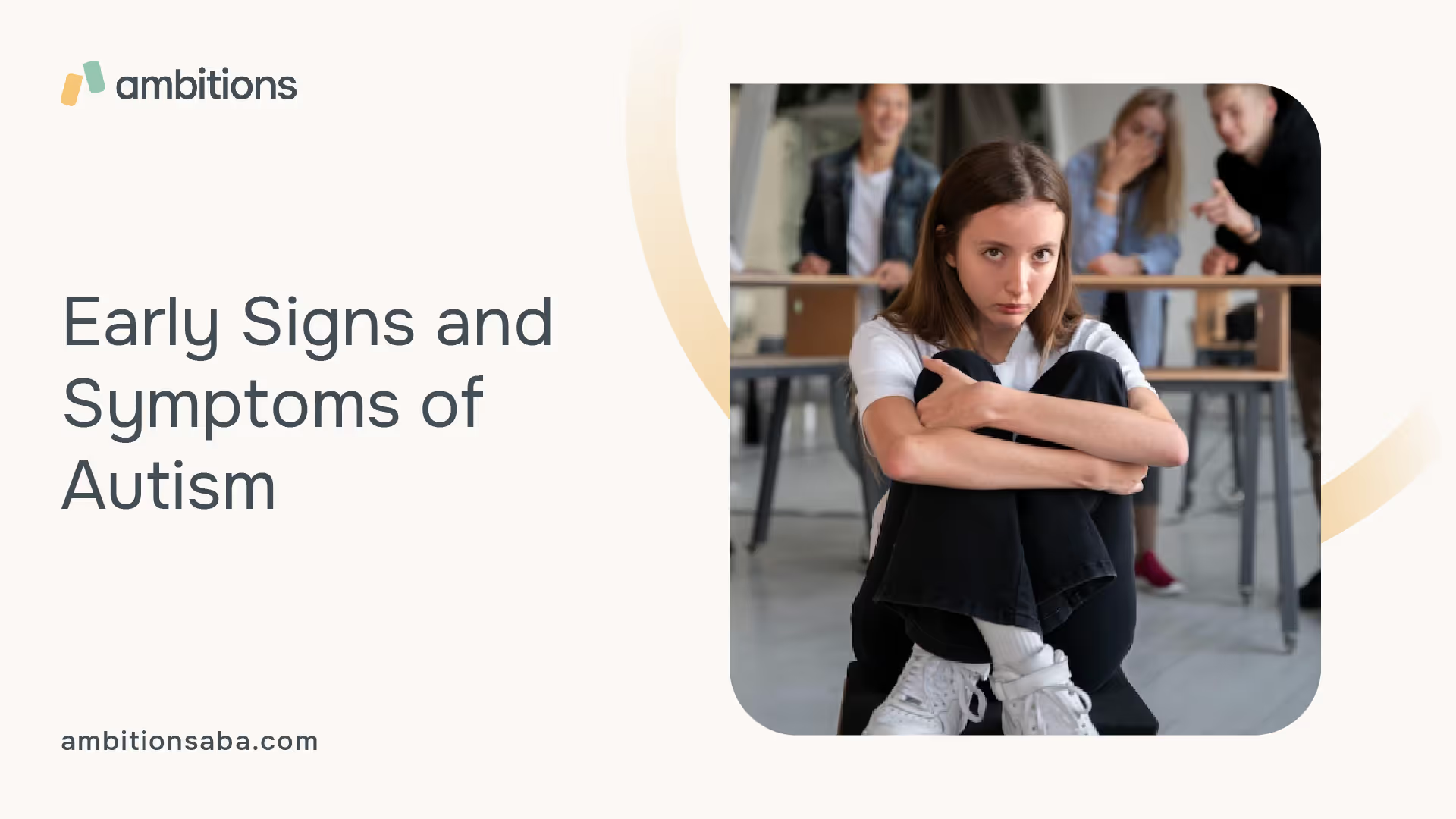Discover effective ABA strategies for school success and help your child thrive academically and socially!
Can You Develop Autism?

Autism spectrum disorder (ASD) is a complex neurodevelopmental disorder that affects communication, social interaction, and behavior. ASD is a lifelong condition that typically appears in early childhood, and it is estimated to affect around 1 in 54 children in the United States.
Many people wonder whether ASD can be developed later in life or if it is something that is present from birth. The short answer is that autism cannot be developed later in life. Autism is a developmental disorder that is present from birth, although it may not be diagnosed until later in childhood.
However, the symptoms of autism can become more apparent as a child grows and develops, and some people may not receive a diagnosis until they are adults.
Autism is a complex disorder that has a strong genetic component. Research has shown that there are many genes that contribute to the development of autism, and it is likely that there are many different genetic pathways that can lead to the disorder.
It is also believed that environmental factors may play a role in the development of autism, although the exact nature of these factors is not yet fully understood.
There is no single cause of autism, and it is likely that a combination of genetic and environmental factors are involved. Some of the genetic factors that have been linked to autism include mutations in certain genes, problems with the way that genes are expressed, and copy number variations (CNVs) – which are changes in the number of copies of a particular gene.
Environmental factors that have been linked to autism include prenatal exposure to certain chemicals, such as pesticides and phthalates, as well as complications during pregnancy or birth. However, it is important that not all children who are exposed to these factors will develop autism, and not all children with autism have been exposed to these factors.
While it is not possible to develop autism later in life, there are some conditions that can mimic the symptoms of autism. For example, some people may develop social anxiety disorder, which can cause them to have difficulty with social interactions and communication.
Other conditions that can mimic the symptoms of autism include attention deficit hyperactivity disorder (ADHD), obsessive-compulsive disorder (OCD), and schizophrenia.
Diagnosing and Assessing Autism
Diagnosing autism can be a complex process that involves observing a child's behavior and developmental history. There is no single test for autism, and diagnosis typically involves a comprehensive evaluation by a team of healthcare professionals, including a pediatrician, psychologist, and speech therapist.
The assessment process typically begins with an initial screening to determine if further evaluation is necessary. This may involve asking parents or caregivers about their child's development and behavior, as well as administering standardized questionnaires or checklists.
If further evaluation is needed, the child may undergo a more comprehensive assessment that includes observation of their behavior in various settings, such as at home and at school. The assessment may also include cognitive testing to evaluate the child's intellectual abilities.
In order to be diagnosed with autism, a child must meet certain criteria outlined in the Diagnostic and Statistical Manual of Mental Disorders (DSM-5). These criteria include persistent deficits in social communication and interaction, as well as restricted or repetitive patterns of behavior.
It is important that autism is a spectrum disorder, which means that individuals with the disorder can have varying degrees of impairment. As such, diagnosis can be challenging and requires careful consideration of an individual's unique profile of symptoms.
Overall, early diagnosis and intervention are critical for improving outcomes for individuals with autism. With appropriate support and treatment, many individuals with autism are able to lead fulfilling lives and achieve their full potential.
Myths and Misconceptions about Autism

There are many myths and misconceptions surrounding autism that can lead to misunderstandings and stigmatization of individuals with the disorder. Here are some common myths that need to be dispelled:
Myth 1: Autism is caused by bad parenting or a lack of discipline. This myth has been thoroughly debunked by scientific research. Autism is a complex neurodevelopmental disorder that has a strong genetic component.
Myth 2: All individuals with autism have extraordinary skills or savant abilities. While it is true that some individuals with autism have exceptional skills in certain areas, such as music or mathematics, this is not true for all individuals with the disorder.
Myth 3: Individuals with autism do not want friends or social interaction. This myth is simply not true. Many individuals with autism crave social interaction and friendships, but they may struggle with social communication and understanding social cues.
Myth 4: Individuals with autism cannot live independently or hold down a job. With appropriate support and accommodations, many individuals with autism are able to live independently and pursue meaningful careers.
It is important to dispel these myths in order to promote greater understanding and acceptance of individuals with autism. By recognizing the diversity of experiences within the autistic community, we can work towards creating a more inclusive society that values neurodiversity.
Early Signs and Symptoms of Autism

Early identification and intervention are crucial for children with autism. While the symptoms of autism can vary widely, there are some early signs that parents should look out for. Here are some common early signs and symptoms of autism:
Delayed speech or language skills: Children with autism may have delayed speech or language skills. They may not babble or coo in infancy, and they may not start using words until later than other children.
Lack of social interaction: Children with autism may have difficulty engaging in social interactions with others. They may not respond to their name or make eye contact, and they may not show interest in playing with others.
Repetitive behaviors: Children with autism may engage in repetitive behaviors, such as flapping their hands, rocking back and forth, or spinning in circles.
Difficulty adapting to change: Children with autism may have difficulty adapting to changes in routine or environment. They may become upset by minor changes, such as a different route to school or a new classroom.
Sensory sensitivities: Children with autism may be hypersensitive or hyposensitive to sensory stimuli. For example, they may be bothered by certain sounds or textures, or they may seek out certain types of sensory input.
It is important that not all children with autism will exhibit these early signs and symptoms, and some children without autism may exhibit them as well. However, if you notice any of these signs in your child, it is important to talk to your pediatrician about further evaluation.
Early intervention can greatly improve outcomes for children with autism by providing support for social communication and behavior management skills. With appropriate treatment and support, many children with autism are able to thrive and reach their full potential.
Types of Autism Spectrum Disorder
Autism spectrum disorder is a complex disorder that can present in many different ways. As such, there are different types of autism spectrum disorder that are classified based on their characteristics and symptoms. Here are some of the most common types of autism spectrum disorder:
Classic Autism: Also known as Kanner's autism, this is the most severe form of autism and is characterized by significant deficits in social communication and interaction, as well as restricted and repetitive patterns of behavior. Children with classic autism may also have intellectual disability and language delays.
Asperger's Syndrome: Asperger's syndrome is a milder form of autism that is characterized by difficulties with social communication and interaction, as well as restricted interests and repetitive behaviors. Unlike classic autism, individuals with Asperger's syndrome typically have average or above-average intelligence.
Pervasive Developmental Disorder-Not Otherwise Specified (PDD-NOS): PDD-NOS is a diagnosis used when an individual has some but not all of the characteristic symptoms of autism. Individuals with PDD-NOS may have difficulty with social communication and interaction, as well as restricted interests and repetitive behaviors. However, their symptoms may not be severe enough to meet the criteria for classic autism or Asperger's syndrome.
Childhood Disintegrative Disorder (CDD): CDD is a rare form of autism that typically develops later than other forms of the disorder. Children with CDD may develop normally for several years before experiencing a significant loss of skills in areas such as language, social interaction, and play.
It is important that these classifications are not always clear-cut, and many individuals with autism may exhibit symptoms from multiple categories. Additionally, some experts believe that these subtypes are not useful for understanding the diversity within the autistic community.
Regardless of subtype, early intervention and support are critical for individuals with autism spectrum disorder. By understanding the different types of autism spectrum disorder and their characteristics, we can better support individuals with the disorder and promote greater acceptance and inclusion in our communities.
Benefits of Early Screening and Intervention
Early screening and intervention for children at risk for autism can have numerous benefits. By identifying autism early and providing appropriate support and treatment, we can help children with the disorder reach their full potential.
One of the key benefits of early screening is that it allows for earlier access to interventions that can improve outcomes for children with autism. Studies have shown that early intervention can lead to significant improvements in social communication, behavior management, and cognitive skills.
Another benefit of early screening is that it can help parents and caregivers better understand their child's needs and behavior. With a diagnosis of autism, parents can access resources and support services that can help them better understand how to communicate with their child, manage behavior challenges, and provide appropriate educational opportunities.
Early screening also allows for earlier identification of other conditions that often co-occur with autism, such as ADHD or anxiety disorders. By identifying these conditions early on, healthcare professionals can provide appropriate treatment to address these issues.
Overall, early screening and intervention are critical for improving outcomes for children with autism. By providing appropriate support and treatment as early as possible, we can help children with the disorder reach their full potential and lead fulfilling lives.
FAQs
Can you develop autism later in life?
No, it is not possible to develop autism later in life. Autism is a neurodevelopmental disorder that is present from early childhood and affects the way an individual processes information and interacts with others.
Can vaccines cause autism?
No, there is no scientific evidence to support the claim that vaccines cause autism. The idea that vaccines are linked to autism originated from a fraudulent study that has since been thoroughly debunked by numerous studies.
Is there a cure for autism?
No, there is currently no cure for autism. However, with appropriate support and treatment, many individuals with autism are able to lead fulfilling lives and achieve their full potential.
Do all individuals with autism have intellectual disability?
No, not all individuals with autism have intellectual disability. While some individuals with the disorder may have intellectual disability or significant language delays, others may have average or above-average intelligence.
Is it possible for someone to "outgrow" or recover from autism?
While some children may show significant improvement in their symptoms over time, it is not accurate to say that someone can "outgrow" or recover from autism. Autism is a lifelong condition that affects an individual's way of thinking and interacting with others.
However, with appropriate support and treatment, many individuals with autism are able to learn coping strategies and develop skills that can help them manage their symptoms more effectively.
Summary
In conclusion, autism spectrum disorder is a complex neurodevelopmental disorder that is present from birth. While the symptoms of autism can become more apparent as a child grows and develops, autism cannot be developed later in life.
Autism is a complex disorder that has a strong genetic component, and it is likely that a combination of genetic and environmental factors are involved in its development. While there is no cure for autism, early diagnosis and intervention can help to improve outcomes for children with the disorder.

